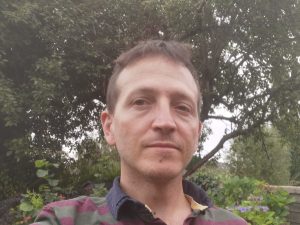
Antony Adamson
The University of Manchester
UK
EMBL Course
This interactive virtual course will provide training in genome editing and cell engineering in mammalian cells and mouse embryos using the highly efficient CRISPR/Cas9 system. The course will be split into two groups (mammalian cells OR mice) based on participants’ expertise.
Through theoretical and interactive sessions as well as remote demonstrations of some of the practical work in the lab, the participants will learn to design CRISPR targets using bioinformatics tools, generating gene knock-outs/knock-ins and target validation using the most current technologies.
Please note that all participants are expected to engage in all sessions.
This course is aimed at researchers who are familiar with basic molecular and cell biology techniques and who want to learn how to create an engineered mammalian cell line or mouse model using the most recent and advanced CRISPR/Cas9 system. No previous experience in genome editing is required.
During this course you will learn:
After this course you should be able to:
“This course is very helpful even for beginners to overcome the barrier and access to CRISPR technique.” – Seungmin Han, WT-CRUK Gurdon Institute, UK
“The EMBL Genome Engineering course provided me with knowledge, confidence and inspiration to use CRISPR/Cas technology.” – Marina Kazantseva, University of Otago, New Zealand

The University of Manchester
UK

EMBL Rome
Italy
Stilla Technologies
France
GlaxoSmithKline
Germany

University of Utah School
of Medicine
USA

Centre for Biomedicine, Self and Society, University of Edinburgh
UK

EMBL Rome
Italy

Integrated DNA Technologies
USA

Universitätsklinikum
Frankfurt
Germany

Max Planck Institute for
Medical Research
Germany

EMBL Heidelberg
Germany

EMBL Heidelberg
Germany
EMBL Heidelberg
Germany
EMBL Rome
Italy

EMBL Heidelberg
Germany

Thermo Fisher Scientific
Germany
Thermo Fisher Scientific
Germany

Thermo Fisher Scientific
USA

EMBL Rome
Italy

Max Planck Institute for
Medical Research
Germany

Thermo Fisher Scientific
Germany

Course and Conference
Officer
EMBL Heidelberg
Germany

Training Laboratory
Manager
EMBL Heidelberg
Germany

Course and Conference
Officer
EMBL Heidelberg
Germany
Got something to say? Tweet it with #EMBLCRISPRcas
All times in the programme below are shown as the time in Europe/Berlin.
To find out the equivalent time zone in your location, enter Berlin, the programme date and time along with your city into the Time Zone Converter.
Please note this is a preliminary programme and is not yet finalised.
| Time (Europe/Berlin) | Session |
|---|---|
| 13:00 – 14:30 | Onboarding and technical troubleshooting |
| Time (Europe/Berlin) | Session |
|---|---|
| 12:45 – 13:00 | Check-in and overview of the day |
| 13:00 – 13:15 | Welcome, housenotes and course overview |
| 13:15 – 14:30 | Icebreaker activity (flashtalks) |
| 14:30 – 14:45 | Break |
| 14:45 – 15:15 | Live Q&A session to pre-recorded talk Some reflections on genome editing Dana Carroll – University of Utah School of Medicine, USA |
| 15:15 – 15:45 | Social activity: Online speed networking break |
| 15:45 – 17:00 | Project discussion in smaller groups Group 1: Mammalian cells Group 2: Mouse embryos |
| Time (Europe/Berlin) | Session |
|---|---|
| 12:45 – 13:00 | Check-in and overview of the day |
| 13:00 – 13:30 | Live Q&A session to pre-recorded talk Purification of Cas9 protein Kim Remans – EMBL Heidelberg, Germany |
| 13:30 – 14:00 | Introduction to practical session The art of CRISPR design: Guide RNA design with Thermo Fisher Alexander Schneidereit – Thermo Fisher Scientific, Germany |
| 14:00 – 14:15 | Break |
| 14:15 – 14:45 | Introduction to practical session Overview of gRNA design tools Birgit Koch – Max Planck Institute for Medical Research, Germany |
| 14:45 – 15:15 | Introduction to practical session gRNA/donor design for embryos Neil Humphreys – EMBL Rome, Italy |
| 15:15 – 15:45 | Break |
| 15:45 – 17:15 | Interactive practical session Group assignment: gRNA and donor design Alexander Schneidereit – Thermo Fisher Scientific, Germany Birgit Koch – Max Planck Institute for Medical Research, Germany Neil Humphreys – EMBL Rome, Italy |
| Time (Europe/Berlin) | Session |
|---|---|
| 12:45 – 13:00 | Check-in and overview of the day |
| 13:00 – 13:30 | Live Q&A session to pre-recorded talk CRISPR-Cas genome editing to generate transgenic mice Neil Humphreys – EMBL Rome, Italy |
| 13:30 – 14:00 | Live Q&A session to pre-recorded talk General cell line generation and validation strategies Birgit Koch – Max Planck Institute for Medical Research, Germany |
| 14:00 – 14:15 | Break |
| 14:15 – 15:45 | Interactive practical session in parallel Practical Group 1: CRISPR cell engineering workflow with live lab demo of FACS analysis Carles Marco Llorca – Thermo Fisher Scientific, Germany Elisabeth Strack – Thermo Fisher Scientific, Germany Practical Group 2: Basic embryo handling with glass transfer pipette prep, harvest embryos and embryo transfer, assess and clean-up 1-cell embryos Neil Humphreys – EMBL Rome, Italy Michela Ascolani – EMBL Rome, Italy Antonella Vecchio – EMBL Rome, Italy Alessandra Pisaniello – EMBL Rome, Italy |
| 15:45 – 16:15 | Break |
| 16:15 – 17:15 | Project discussion in smaller groups Group 1: Mammalian cells Group 2: Mouse embryos |
| Time (Europe/Berlin) | Session |
|---|---|
| 12:45 – 13:00 | Check-in and overview of the day |
| 13:00 – 13:30 | Live Q&A session to pre-recorded talk Gene editing in different experimental models Antony Adamson – The University of Manchester, UK |
| 13:30 – 14:00 | Live Q&A session to pre-recorded talk A human tissue screen identifies a regulator of ER secretion as a brain-size determinant Dominik Lindenhofer – EMBL Heidelberg, Germany |
| 14:00 – 14:15 | Break |
| 14:15 – 15:45 | Interactive practical session in parallel Practical Group 1: Detection of the correct integration of tags via Junction PCR followed by live lab demo of live cell imaging Birgit Koch – Max Planck Institute for Medical Research, Germany Practical Group 2: Microinjection of traffic light reporter TLR2 one cell embryos, assessment of NHEJ vs ssDNA repair via Venus (GFP) and TagRFP fluorescence in post-injected blastocysts Neil Humphreys – EMBL Rome, Italy Michela Ascolani – EMBL Rome, Italy Antonella Vecchio – EMBL Rome, Italy Alessandra Pisaniello – EMBL Rome, Italy |
| 15:45 – 16:15 | Social activity: Virtual pub quiz break |
| 16:15 – 17:35 | Live Q&A session to pre-recorded presentation Genome modification technologies Martin Becker – Stilla Technologies, France Ashley Jacobi – Integrated DNA Technologies, USA Roxanne Strahan – Thermo Fisher Scientific, USA Karl von Laer – New England Biolabs, Germany |
| Time (Europe/Berlin) | Session |
|---|---|
| 12:45 – 13:00 | Check-in and overview of the day |
| 13:00 – 13:30 | Live Q&A session to pre-recorded talk Towards unexpected phenotypes with CRISPR/Cas Manuel Kaulich – Universitätsklinikum Frankfurt, Germany |
| 13:30 – 14:00 | Preparation for interactive session Ethical issues of CRISPR technology and genome engineering Sarah Chan – Centre for Biomedicine, Self and Society, University of Edinburgh, UK |
| 14:00 – 14:15 | Break |
| 14:15 – 15:45 | Interactive practical session Imaged-based high-throughput screening RNAi vs CRISPR Beate Neumann – EMBL Heidelberg, Germany |
| 15:45 – 16:15 | Break |
| 16:15 – 17:15 | Interactive session Ethical issues of CRISPR technology and genome engineering Facilitator: Sarah Chan – Centre for Biomedicine, Self and Society, University of Edinburgh, UK |
| 17:15 onwards | Social activity: Virtual bar mixer |
| Time (Europe/Berlin) | Session |
|---|---|
| 12:45 – 13:00 | Check-in and overview of the day |
| 13:00 – 13:45 | gRNA design assignment presentation |
| 13:45 – 14:15 | Live Q&A session to pre-recorded talk dPCR and CRISPR: Hand-in-hand technologies to make life easier Andrea Callegari – GlaxoSmithKline, Germany Moritz Küblbeck – EMBL Heidelberg, Germany |
| 14:15 – 14:45 | Break |
| 14:45 – 15:30 | Live interactive discussion The solution room: Experts and peer supported advice on your most pressing problems |
| 15:30 – 16:00 | Feedback and wrap-up |
| 16:00 | End of course |
The course is limited to 16 participants. For selection purposes, please note that your application will not be considered without a letter of motivation.
Registration Fees (include admission and all course materials):
| Academia | 295 Euro |
| PhD Student | 295 Euro |
| Industry | 520 Euro |
The registration fee should be paid only after acceptance to the course. The results will be announced approximately 2-3 weeks after the application deadline.
After you have logged in and successfully registered, you will receive an email asking you to submit your motivation letter. Click on the link provided and enter your motivation letter in the text box provided. Alternatively you can submit your motivation letter by clicking on the link on the confirmation page directly after registering.
Instructions
Please note:
Motivation letter length: The maximum limit of 2000 characters (ca. 200 words) refers to manually typed text (spaces included).
Free field text length: The maximum characters for your answers in the free field text boxes is 255 (spaces included).Text only: If you copy-paste the text, hidden formatting might still be included and you will be informed that your text exceeds the character limit. We recommend either:
Symbols: If you have special symbols in your text make sure you are using Unicode characters, otherwise these will not be recognised by the tool.
For further information about registration and motivation letter submission please refer to the FAQ page.
All academic and student registrants are invited to apply for a registration fee waiver, provided by the EMBL Advanced Training Centre Corporate Partnership Programme and EMBO. The registration fee waiver covers the registration sum that you have paid to attend the meeting. Conference participants are not required to pre-pay the registration fee to be selected for a fee waiver for a virtual meeting. If you have already paid the registration fee and are awarded a fee waiver, it will be reimbursed after the meeting. Course participants are required to pay the course fee in advance, which will then be reimbursed after the recipient has attended the course.
For participants and speakers with childcare responsibilities there is the possibility to apply for a grant, provided by the EMBL Advanced Training Centre Corporate Partnership Programme and EMBO, to offset childcare costs incurred when participating at a virtual event. Eligible costs include fees for a babysitter or childcare facility or travel costs for a care giver. Please note that priority will be given to early stage researchers. Costs will be reimbursed after the meeting only once a reimbursement form and original receipts have been received. Attendance at the event is required in order to be eligible to receive the reimbursement. In order to apply for this grant, you must be registered by the abstract submission deadline.
Applies to selected courses only. Availability will be indicated during the abstract or motivation letter submission process.
This grant covers costs related to your attendance to the course (registration, travel and accommodation costs). The grant is restricted to PhD students and postdocs who conduct basic biomedical research.
Whether you are eligible to apply for a travel grant, depends on when you received your university entrance qualification (e.g. Abitur, A-Levels, High School Diploma, Final State Examination):
– for PhD and MD students, as well as graduates, the university entrance qualification must not have been obtained more than 11 years ago at the time of the envisaged course
– for postdocs, the university entrance qualification must not have been obtained more than 13 years ago at the time of the envisaged course
Applications for financial assistance can be submitted via the submission portal* (for the submission of abstracts for conferences or the submission of motivation letters for courses) by completing the Financial Assistance Application Section (underneath the section for entering abstract/motivation letter information). The link to the portal can be found in the registration confirmation email that you will receive after registering for the conference or course.
For conferences, if you are not submitting an abstract, you can still apply for financial assistance in the submission portal. Read the instructions on how to apply for financial assistance.
Note that priority will be given to those submitting an abstract to present at the conference. In your application you will be asked to answer questions regarding your motivation for applying, and, for registration fee waivers, the reasons why your lab cannot fund your attendance and how your attendance will make a difference to your career. Application for financial support will not affect the outcome of your registration application.
*For some events, applications for Childcare Grants will still be done by email. Information about the grant will be sent out shortly after the abstract/motivation letter deadline. Please contact the event Conference Officer if you have any questions.
The scientific organisers will select the recipients of registration fee waivers during the abstract selection process for conferences and the participant selection process for courses. Results will be announced approximately 3-4 weeks before the event start date. Selection results do not impact your admission to the meeting. Registration fee waiver selection is based on your current work or study location, your motivation for applying, the reasons for needing financial support and the impact this event will have on your career. Childcare grants are allocated based on career stage, with priority given to early stage researchers.
Check out this list of external funding opportunities or get more information on attending the conference as an event reporter.
For further information about financial assistance please refer to the FAQ page.
Below you will find the software and technical requirements for this course. You will need admin rights to be able to install the software on your computer and we recommend you try this before the course. If you do not have admin rights, please contact your technical support team in advance to make sure the software can be installed.
The EMBL eCampus learning platform will be used to collaborate, communicate and network with all of the course participants. All participants will receive information on how to join shortly before the course. We recommend using Chrome, Safari or Mozilla Firefox browsers for eCampus.
Zoom will be used for the live talks and Q&A sessions. More information will be provided closer to the start of the course.
While participating in the course, please make sure you have nothing else using your bandwidth. We recommend using a wired connection.
Please do:
Please don’t:
Additional information can be found in our Code of Conduct.
It is important to stay healthy and move around, especially when you are attending an event virtually. We have put together a few coffee break stretches and yoga videos in eCampus for you to enjoy during the event.
Questions during and after the talks can be asked in the live streaming platform. If time runs out or you think of a question later, you can use the EMBL eCampus forum or send a direct message to the speaker/trainer.
The programme is planned based on the Europe/Berlin time zone, unless otherwise stated. As many virtual participants are attending from around the world, we do our best to accommodate as many time zones as possible when creating the programme. Please take your time zone into consideration when planning your attendance.
Media Partner
Sponsorship Opportunities
We offer a variety of event sponsoring possibilities, with the flexibility to select a set sponsorship package or combine individual sponsorship options to suit your event budget. Discounts are available for companies sponsoring multiple events at EMBL Heidelberg. View other conferences, or contact sponsorship@embl.de for further information.
If you are interested in becoming a media partner of this event, please visit our media partnerships webpage.

Date: 27 Sep - 4 Oct 2021
Location: Virtual
Deadline(s):
Application: Closed
Organisers:
Contact: Lisa Trinh